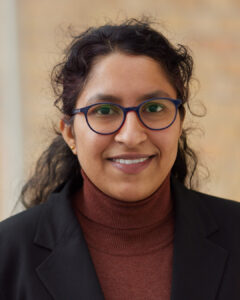Ramya Koduvayur Ananthanarayanan’s Interview
Starting date: 07.11.2022
Nationality : Indian
Implementing Partner : FRM II, TUM
Main supervisor: Professor Stephan Förster

Few words about you and your research project
Hi, I am Ramya, and I recently joined Forschungs-neutronenquelle Heinz Maier-Leibnitz FRM II and Physik Department E13, Technische Universität München as a GNeuS postdoc fellow. Herein, I work with Dr. Christopher J. Garvey.
The primary goal of my research project is to investigate the structure-property-function relationships in soft materials using Scattering and Rheo-Scattering techniques. Rheo-SANS with optimized data analysis protocols for time-resolved elastic scattering measurements during transient shear flows is of specific interest. The work will help address some fundamental questions in soft matter, such as the complex structure and polyelectrolyte nature of biomacromolecules ‘mucins’ of interest to biomedical applications; the evolution of out-of-equilibrium structures formed by soft colloid-polymer systems during deformations pertinent to personal care applications; and fractal dimensions of the networked structure formed by dairy gels, and their broader implications in food systems.
To build my expertise in Scattering and Rheology, I will be undertaking two secondments during my research project. These secondments will provide me with valuable training, and perspectives on effective structural characterization of the aforementioned soft materials. The first secondment, which is academic, will be conducted at the NIST Centre for Neutron Research in Maryland, USA. At NIST, I will undergo Rheo-SANS training, learn advanced data processing concepts, and conduct preliminary experiments.
The second secondment will be non-academic and conducted at Anton Paar Germany GmbH. Therein, I will explore advanced Rheometry and other combined techniques.
What is your background? How have you heard about GNeuS?
I am a Chemical Engineer, with a doctoral degree from the Indian Institute of Technology Madras. My thesis focused on performing oscillatory rheology to understand the physical behaviour of structured materials and the mechanistic development of constitutive models to describe their response. After completing my Ph.D, I actively sought out challenging research projects in both academia and Industry. During my search, I came across a project advertised by Dr. Chris in a soft matter mailing list we were mutually subscribed to, and expressed my interest. He informed me of the first call of GNeuS fellowship, an opportunity at the right time.
After multiple discussions, we were able to formulate a research project that combined the fields of rheology and neutron scattering to advance our understanding of soft matter.
Before GNeuS, I worked as a Scientist (products and process) at the cosmetic skincare company, Almora Botanica UK Ltd. in Bangalore, India, followed by a short postdoc at the Ingénierie des Matériaux Polymères IMP laboratoire, Institut National des Sciences Appliquées de Lyon, France.
Interested in my research, follow the link
Why did you apply specifically on GNeuS?
GNeuS is a meticulously designed program that serves as a catalyst for advancing scientists’ careers. Through GNeuS, I will have access to several new cutting-edge research facilities, enabling me to establish a robust foundation for my career as a researcher. Moreover, I will have the opportunity to explore innovative ideas and collaborate with individuals possessing diverse expertise.
I find GNeuS fellowship as an excellent platform to learn new techniques from both academic and Industrial establishments. By gaining interdisciplinary and intersectoral experiences, I will acquire an array of research methodologies, perspectives, and transferable skills that will aid in my future contributions to the field of soft material science and Engineering.
What impacts do you expect from the GNeuS fellowship?
The GNeuS fellowship presents a unique opportunity for me to undertake research at the intersection of fundamental and applied approaches in Soft Matter. Through this fellowship, I aim to acquire the skills necessary to develop innovative, efficient solutions for problems in soft material technology relevant to biomedical, food and personal-care industries, thus contributing to advancements in the field.
By participating in conferences, workshops, and publishing the research, this fellowship will also enable me to establish a strong network of collaborators and field experts, essential for my professional development.
Overall, I am to excited to show the potential of this fellowship to comprehend soft matter physics.
